Graduate+Student
-
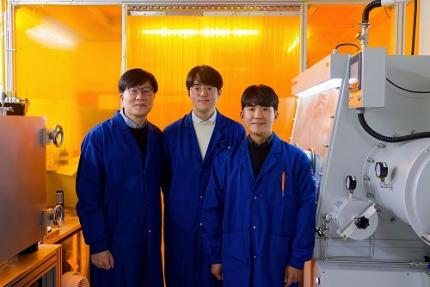 KAIST Develops Wearable Carbon Dioxide Sensor to Enable Real-time Apnea Diagnosis
- Professor Seunghyup Yoo’s research team of the School of Electrical Engineering developed an ultralow-power carbon dioxide (CO2) sensor using a flexible and thin organic photodiode, and succeeded in real-time breathing monitoring by attaching it to a commercial mask
- Wearable devices with features such as low power, high stability, and flexibility can be utilized for early diagnosis of various diseases such as chronic obstructive pulmonary disease and sleep apnea
< Photo 1. From the left, School of Electrical Engineering, Ph.D. candidate DongHo Choi, Professor Seunghyup Yoo, and Department of Materials Science and Engineering, Bachelor’s candidate MinJae Kim >
Carbon dioxide (CO2) is a major respiratory metabolite, and continuous monitoring of CO2 concentration in exhaled breath is not only an important indicator for early detection and diagnosis of respiratory and circulatory system diseases, but can also be widely used for monitoring personal exercise status. KAIST researchers succeeded in accurately measuring CO2 concentration by attaching it to the inside of a mask.
KAIST (President Kwang-Hyung Lee) announced on February 10th that Professor Seunghyup Yoo's research team in the Department of Electrical and Electronic Engineering developed a low-power, high-speed wearable CO2 sensor capable of stable breathing monitoring in real time.
Existing non-invasive CO2 sensors had limitations in that they were large in size and consumed high power. In particular, optochemical CO2 sensors using fluorescent molecules have the advantage of being miniaturized and lightweight, but due to the photodegradation phenomenon of dye molecules, they are difficult to use stably for a long time, which limits their use as wearable healthcare sensors.
Optochemical CO2 sensors utilize the fact that the intensity of fluorescence emitted from fluorescent molecules decreases depending on the concentration of CO2, and it is important to effectively detect changes in fluorescence light.
To this end, the research team developed a low-power CO2 sensor consisting of an LED and an organic photodiode surrounding it. Based on high light collection efficiency, the sensor, which minimizes the amount of excitation light irradiated on fluorescent molecules, achieved a device power consumption of 171 μW, which is tens of times lower than existing sensors that consume several mW.
< Figure 1. Structure and operating principle of the developed optochemical carbon dioxide (CO2) sensor. Light emitted from the LED is converted into fluorescence through the fluorescent film, reflected from the light scattering layer, and incident on the organic photodiode. CO2 reacts with a small amount of water inside the fluorescent film to form carbonic acid (H2CO3), which increases the concentration of hydrogen ions (H+), and the fluorescence intensity due to 470 nm excitation light decreases. The circular organic photodiode with high light collection efficiency effectively detects changes in fluorescence intensity, lowers the power required light up the LED, and reduces light-induced deterioration. >
The research team also elucidated the photodegradation path of fluorescent molecules used in CO2 sensors, revealed the cause of the increase in error over time in photochemical sensors, and suggested an optical design method to suppress the occurrence of errors.
Based on this, the research team developed a sensor that effectively reduces errors caused by photodegradation, which was a chronic problem of existing photochemical sensors, and can be used continuously for up to 9 hours while existing technologies based on the same material can be used for less than 20 minutes, and can be used multiple times when replacing the CO2 detection fluorescent film.
< Figure 2. Wearable smart mask and real-time breathing monitoring. The fabricated sensor module consists of four elements (①: gas-permeable light-scattering layer, ②: color filter and organic photodiode, ③: light-emitting diode, ④: CO2-detecting fluorescent film). The thin and light sensor (D1: 400 nm, D2: 470 nm) is attached to the inside of the mask to monitor the wearer's breathing in real time. >
The developed sensor accurately measured CO2 concentration by being attached to the inside of a mask based on the advantages of being light (0.12 g), thin (0.7 mm), and flexible. In addition, it showed fast speed and high resolution that can monitor respiratory rate by distinguishing between inhalation and exhalation in real time.
< Photo 2. The developed sensor attached to the inside of the mask >
Professor Seunghyup Yoo said, "The developed sensor has excellent characteristics such as low power, high stability, and flexibility, so it can be widely applied to wearable devices, and can be used for the early diagnosis of various diseases such as hypercapnia, chronic obstructive pulmonary disease, and sleep apnea." He added, "In particular, it is expected to be used to improve side effects caused by rebreathing in environments where dust is generated or where masks are worn for long periods of time, such as during seasonal changes."
This study, in which KAIST's Department of Materials Science and Engineering's undergraduate student Minjae Kim and School of Electrical Engineering's doctoral student Dongho Choi participated as joint first authors, was published in the online version of Cell's sister journal, Device, on the 22nd of last month. (Paper title: Ultralow-power carbon dioxide sensor for real-time breath monitoring) DOI: https://doi.org/10.1016/j.device.2024.100681
< Photo 3. From the left, Professor Seunghyup Yoo of the School of Electrical Engineering, MinJae Kim, an undergraduate student in the Department of Materials Science and Engineering, and Dongho Choi, a doctoral student in the School of Electrical Engineering >
This study was supported by the Ministry of Trade, Industry and Energy's Materials and Components Technology Development Project, the National Research Foundation of Korea's Original Technology Development Project, and the KAIST Undergraduate Research Participation Project. This work was supported by the (URP) program.
2025.02.13 View 4608
KAIST Develops Wearable Carbon Dioxide Sensor to Enable Real-time Apnea Diagnosis
- Professor Seunghyup Yoo’s research team of the School of Electrical Engineering developed an ultralow-power carbon dioxide (CO2) sensor using a flexible and thin organic photodiode, and succeeded in real-time breathing monitoring by attaching it to a commercial mask
- Wearable devices with features such as low power, high stability, and flexibility can be utilized for early diagnosis of various diseases such as chronic obstructive pulmonary disease and sleep apnea
< Photo 1. From the left, School of Electrical Engineering, Ph.D. candidate DongHo Choi, Professor Seunghyup Yoo, and Department of Materials Science and Engineering, Bachelor’s candidate MinJae Kim >
Carbon dioxide (CO2) is a major respiratory metabolite, and continuous monitoring of CO2 concentration in exhaled breath is not only an important indicator for early detection and diagnosis of respiratory and circulatory system diseases, but can also be widely used for monitoring personal exercise status. KAIST researchers succeeded in accurately measuring CO2 concentration by attaching it to the inside of a mask.
KAIST (President Kwang-Hyung Lee) announced on February 10th that Professor Seunghyup Yoo's research team in the Department of Electrical and Electronic Engineering developed a low-power, high-speed wearable CO2 sensor capable of stable breathing monitoring in real time.
Existing non-invasive CO2 sensors had limitations in that they were large in size and consumed high power. In particular, optochemical CO2 sensors using fluorescent molecules have the advantage of being miniaturized and lightweight, but due to the photodegradation phenomenon of dye molecules, they are difficult to use stably for a long time, which limits their use as wearable healthcare sensors.
Optochemical CO2 sensors utilize the fact that the intensity of fluorescence emitted from fluorescent molecules decreases depending on the concentration of CO2, and it is important to effectively detect changes in fluorescence light.
To this end, the research team developed a low-power CO2 sensor consisting of an LED and an organic photodiode surrounding it. Based on high light collection efficiency, the sensor, which minimizes the amount of excitation light irradiated on fluorescent molecules, achieved a device power consumption of 171 μW, which is tens of times lower than existing sensors that consume several mW.
< Figure 1. Structure and operating principle of the developed optochemical carbon dioxide (CO2) sensor. Light emitted from the LED is converted into fluorescence through the fluorescent film, reflected from the light scattering layer, and incident on the organic photodiode. CO2 reacts with a small amount of water inside the fluorescent film to form carbonic acid (H2CO3), which increases the concentration of hydrogen ions (H+), and the fluorescence intensity due to 470 nm excitation light decreases. The circular organic photodiode with high light collection efficiency effectively detects changes in fluorescence intensity, lowers the power required light up the LED, and reduces light-induced deterioration. >
The research team also elucidated the photodegradation path of fluorescent molecules used in CO2 sensors, revealed the cause of the increase in error over time in photochemical sensors, and suggested an optical design method to suppress the occurrence of errors.
Based on this, the research team developed a sensor that effectively reduces errors caused by photodegradation, which was a chronic problem of existing photochemical sensors, and can be used continuously for up to 9 hours while existing technologies based on the same material can be used for less than 20 minutes, and can be used multiple times when replacing the CO2 detection fluorescent film.
< Figure 2. Wearable smart mask and real-time breathing monitoring. The fabricated sensor module consists of four elements (①: gas-permeable light-scattering layer, ②: color filter and organic photodiode, ③: light-emitting diode, ④: CO2-detecting fluorescent film). The thin and light sensor (D1: 400 nm, D2: 470 nm) is attached to the inside of the mask to monitor the wearer's breathing in real time. >
The developed sensor accurately measured CO2 concentration by being attached to the inside of a mask based on the advantages of being light (0.12 g), thin (0.7 mm), and flexible. In addition, it showed fast speed and high resolution that can monitor respiratory rate by distinguishing between inhalation and exhalation in real time.
< Photo 2. The developed sensor attached to the inside of the mask >
Professor Seunghyup Yoo said, "The developed sensor has excellent characteristics such as low power, high stability, and flexibility, so it can be widely applied to wearable devices, and can be used for the early diagnosis of various diseases such as hypercapnia, chronic obstructive pulmonary disease, and sleep apnea." He added, "In particular, it is expected to be used to improve side effects caused by rebreathing in environments where dust is generated or where masks are worn for long periods of time, such as during seasonal changes."
This study, in which KAIST's Department of Materials Science and Engineering's undergraduate student Minjae Kim and School of Electrical Engineering's doctoral student Dongho Choi participated as joint first authors, was published in the online version of Cell's sister journal, Device, on the 22nd of last month. (Paper title: Ultralow-power carbon dioxide sensor for real-time breath monitoring) DOI: https://doi.org/10.1016/j.device.2024.100681
< Photo 3. From the left, Professor Seunghyup Yoo of the School of Electrical Engineering, MinJae Kim, an undergraduate student in the Department of Materials Science and Engineering, and Dongho Choi, a doctoral student in the School of Electrical Engineering >
This study was supported by the Ministry of Trade, Industry and Energy's Materials and Components Technology Development Project, the National Research Foundation of Korea's Original Technology Development Project, and the KAIST Undergraduate Research Participation Project. This work was supported by the (URP) program.
2025.02.13 View 4608 -
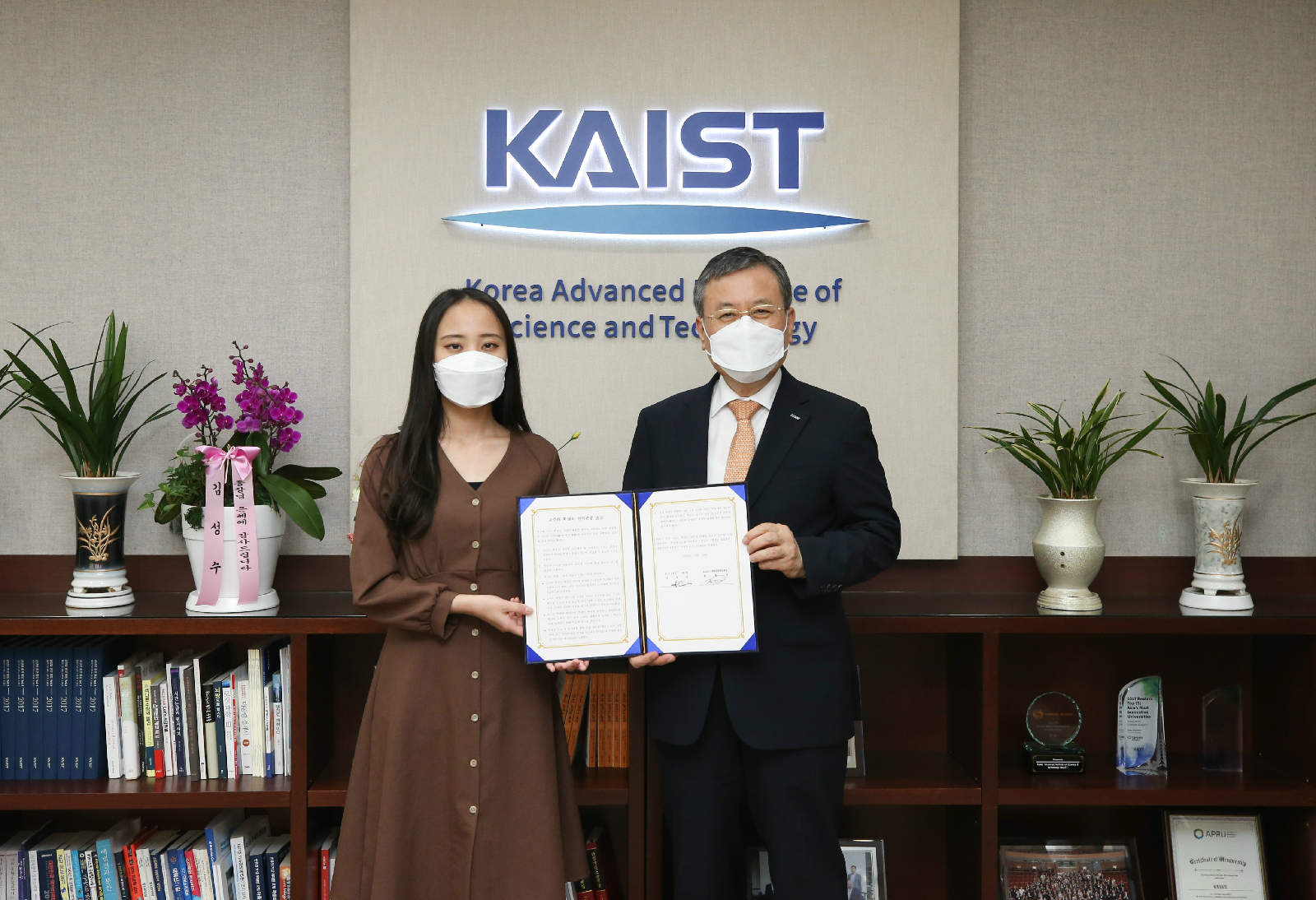 New Charter of Respect and Loyalty between Professors and Graduate Students
KAIST established a ‘Charter of Respect and Loyalty between Professors and Graduate Students’. This new charter states measures to build trust between professors and graduate students, and improve the working conditions of graduate students.
KAIST President Sung-Chul Shin and President of the KAIST Graduate Student Association (GSA) Hye-Jeong Han signed the charter as representatives of the professors and graduate students on May 18.
KAIST has become the first university in Korea to officially proclaim a promise between the school and the student council for the betterment of conditions for graduate students, and the first to specifically guarantee full-time graduate students’ vacations.
Graduate students have a unique status as both students receiving education and employees performing lab research. The GSA explained that “however, in reality, this unique status places them in a blind spot where they are not being fully entitled to their rights neither as employees nor students.”
The newly established charter is a set of promises made between professors and graduate students to uphold the values of respect and loyalty, and to establish trust in each other. Professors should treat each student not only as someone they should teach thoroughly, but also as a human being who should be respected. The graduate student should also respect the professor, and diligently perform their educational and research duties.
The charter also includes provisions stating that professors should provide minimum grants for the encouragement of research and education to the graduate students transparently and reasonably. In addition, professors must define a fixed number of hours that graduates students have to participate in education and research projects, and guarantee vacation leave for graduate students. Degree and graduation requirements should be clearly defined, and graduate students should devote themselves to education and research, and adhere to research ethics and safety measures.
(END)
2020.05.18 View 5142
New Charter of Respect and Loyalty between Professors and Graduate Students
KAIST established a ‘Charter of Respect and Loyalty between Professors and Graduate Students’. This new charter states measures to build trust between professors and graduate students, and improve the working conditions of graduate students.
KAIST President Sung-Chul Shin and President of the KAIST Graduate Student Association (GSA) Hye-Jeong Han signed the charter as representatives of the professors and graduate students on May 18.
KAIST has become the first university in Korea to officially proclaim a promise between the school and the student council for the betterment of conditions for graduate students, and the first to specifically guarantee full-time graduate students’ vacations.
Graduate students have a unique status as both students receiving education and employees performing lab research. The GSA explained that “however, in reality, this unique status places them in a blind spot where they are not being fully entitled to their rights neither as employees nor students.”
The newly established charter is a set of promises made between professors and graduate students to uphold the values of respect and loyalty, and to establish trust in each other. Professors should treat each student not only as someone they should teach thoroughly, but also as a human being who should be respected. The graduate student should also respect the professor, and diligently perform their educational and research duties.
The charter also includes provisions stating that professors should provide minimum grants for the encouragement of research and education to the graduate students transparently and reasonably. In addition, professors must define a fixed number of hours that graduates students have to participate in education and research projects, and guarantee vacation leave for graduate students. Degree and graduation requirements should be clearly defined, and graduate students should devote themselves to education and research, and adhere to research ethics and safety measures.
(END)
2020.05.18 View 5142 -
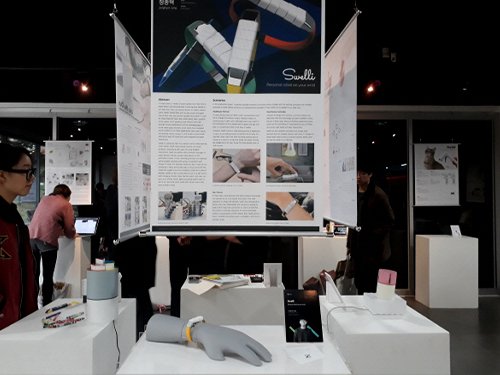 IDKAIST Graduation Show, Interative and Innovative Works
Undergraduate students from the Department of Industrial Design at KAIST opened up their graduation show in the Industrial Design Building for eight days in KAIST from November 10 and another four days in Coex, Seoul from December 7.
The students showcased their creative and novel works in the exhibition. Some designs successfully showed change concepts such as for mixing straws. There were also several projects designed to meet individual demand, such as a customized shoe-making application and personal makeup colorings.
Since the establishment of its undergraduate program in 1983, the department has held a graduation show to demonstrate four years of the students’ academic work and research performance to KAIST members, externals specialists, and the public.
Professor Daniel Saakes, who is in charge of the show, said, “Please come by the show and support the 28 students for their hard work. This year, students’ projects are more socially-oriented through applications and social media, making them easily approachable for consumers.”
2017.11.13 View 7116
IDKAIST Graduation Show, Interative and Innovative Works
Undergraduate students from the Department of Industrial Design at KAIST opened up their graduation show in the Industrial Design Building for eight days in KAIST from November 10 and another four days in Coex, Seoul from December 7.
The students showcased their creative and novel works in the exhibition. Some designs successfully showed change concepts such as for mixing straws. There were also several projects designed to meet individual demand, such as a customized shoe-making application and personal makeup colorings.
Since the establishment of its undergraduate program in 1983, the department has held a graduation show to demonstrate four years of the students’ academic work and research performance to KAIST members, externals specialists, and the public.
Professor Daniel Saakes, who is in charge of the show, said, “Please come by the show and support the 28 students for their hard work. This year, students’ projects are more socially-oriented through applications and social media, making them easily approachable for consumers.”
2017.11.13 View 7116 -
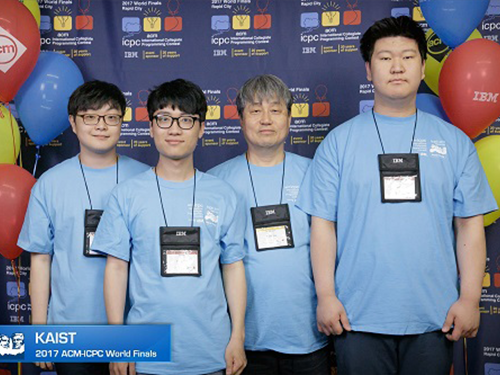 KAIST Team Wins Bronze Medal at Int'l Programming Contest
A KAIST Team consisting of undergraduate students from the School of Computing and Department of Mathematical Science received a bronze medal and First Problem Solver award at an international undergraduate programming competition, The Association for Computing Machinery-International Collegiate Programming Contest (ACM-ICPC) World Finals.
The 41st ACM-ICPC hosted by ACM and funded by IBM was held in South Dakota in the US on May 25. The competition, first held in 1977, is aimed at undergraduate students from around the world. A total of 50,000 students from 2900 universities and 103 countries participated in the regional competition and 400 students competed in the finals.
The competition required teams of three to solve 12 problems. The KAIST team was coached by Emeritus Professor Sung-Yong Shin and Professor Taisook Han. The student contestants were Jihoon Ko and Hanpil Kang from the School of Computing and Jongwoon Lee from the Department of Mathematical Science. The team finished ranked 9th, receiving a bronze medal and a $3000 prize. Additionally, the team was the first to solve all the problems and received the First Problem Solver award. Detailed score information can be found on. https://icpc.baylor.edu/scoreboard/
(Photo caption: Professor Taisook Han and his students)
2017.06.12 View 10555
KAIST Team Wins Bronze Medal at Int'l Programming Contest
A KAIST Team consisting of undergraduate students from the School of Computing and Department of Mathematical Science received a bronze medal and First Problem Solver award at an international undergraduate programming competition, The Association for Computing Machinery-International Collegiate Programming Contest (ACM-ICPC) World Finals.
The 41st ACM-ICPC hosted by ACM and funded by IBM was held in South Dakota in the US on May 25. The competition, first held in 1977, is aimed at undergraduate students from around the world. A total of 50,000 students from 2900 universities and 103 countries participated in the regional competition and 400 students competed in the finals.
The competition required teams of three to solve 12 problems. The KAIST team was coached by Emeritus Professor Sung-Yong Shin and Professor Taisook Han. The student contestants were Jihoon Ko and Hanpil Kang from the School of Computing and Jongwoon Lee from the Department of Mathematical Science. The team finished ranked 9th, receiving a bronze medal and a $3000 prize. Additionally, the team was the first to solve all the problems and received the First Problem Solver award. Detailed score information can be found on. https://icpc.baylor.edu/scoreboard/
(Photo caption: Professor Taisook Han and his students)
2017.06.12 View 10555 -
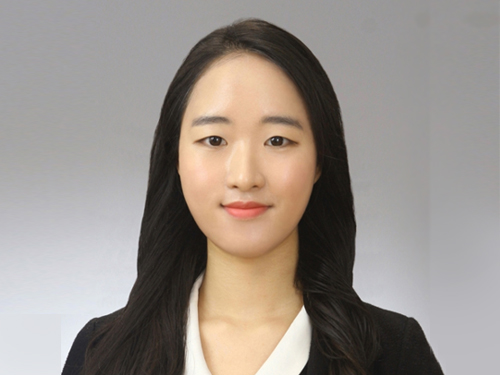 Seo-Eun Lee, an undergaruate student receives the Best Paper Award from Optical Society of Korea
Seo-Eun Lee, a student studying at KAIST’s Department of Biological Sciences, has won the Best Paper Award from Bio-Photonics Division at the 2014 Optical Society of Korea Winter Conference, held on 19th February at Daejeon Convention Center.
Only one outstanding paper per division is given an award among the total of 270 papers, and it is very unusual for an undergraduate student to win the award in the field that is not her major.
Lee has studied cell imaging using holography technology since June 2013 under the supervision of Professor Yong-Geun Park from the Department of Physics.
The Optical Society of Korea was founded in 1989, and as the largest academy in the field of optics in Korea, it holds academic presentations, seminars and lectures every year.
2014.03.06 View 10666
Seo-Eun Lee, an undergaruate student receives the Best Paper Award from Optical Society of Korea
Seo-Eun Lee, a student studying at KAIST’s Department of Biological Sciences, has won the Best Paper Award from Bio-Photonics Division at the 2014 Optical Society of Korea Winter Conference, held on 19th February at Daejeon Convention Center.
Only one outstanding paper per division is given an award among the total of 270 papers, and it is very unusual for an undergraduate student to win the award in the field that is not her major.
Lee has studied cell imaging using holography technology since June 2013 under the supervision of Professor Yong-Geun Park from the Department of Physics.
The Optical Society of Korea was founded in 1989, and as the largest academy in the field of optics in Korea, it holds academic presentations, seminars and lectures every year.
2014.03.06 View 10666 -
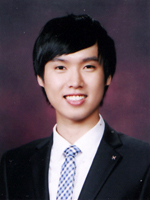 KAIST Student Awarded Prize from Energy Saving Contest
Jun-Min Kwon, an undergraduate student in the Department of Chemistry at KAIST, was awarded a prize from the Ministry of Trade, Industry and Energy, Republic of Korea, at the 35th Energy Saving Contest which was held on November 20.
The student club he has been leading was also selected as one of the best groups by the Save Energy Save Earth (SESE), a volunteer organization supported by the Korea Energy Management Corporation and the Ministry of Knowledge Economy, Republic of Korea.
Kwon began promoting energy conservation through a blog and participated in related meetings and workshops as a high school student to improve the understanding on the importance of energy saving and recycling.He also received awards from the Second National Assembly Forum on Climate Change, the Korean National Science Fair, as well as the Samsung Human Tech Paper Award.
2013.12.24 View 13528
KAIST Student Awarded Prize from Energy Saving Contest
Jun-Min Kwon, an undergraduate student in the Department of Chemistry at KAIST, was awarded a prize from the Ministry of Trade, Industry and Energy, Republic of Korea, at the 35th Energy Saving Contest which was held on November 20.
The student club he has been leading was also selected as one of the best groups by the Save Energy Save Earth (SESE), a volunteer organization supported by the Korea Energy Management Corporation and the Ministry of Knowledge Economy, Republic of Korea.
Kwon began promoting energy conservation through a blog and participated in related meetings and workshops as a high school student to improve the understanding on the importance of energy saving and recycling.He also received awards from the Second National Assembly Forum on Climate Change, the Korean National Science Fair, as well as the Samsung Human Tech Paper Award.
2013.12.24 View 13528 -
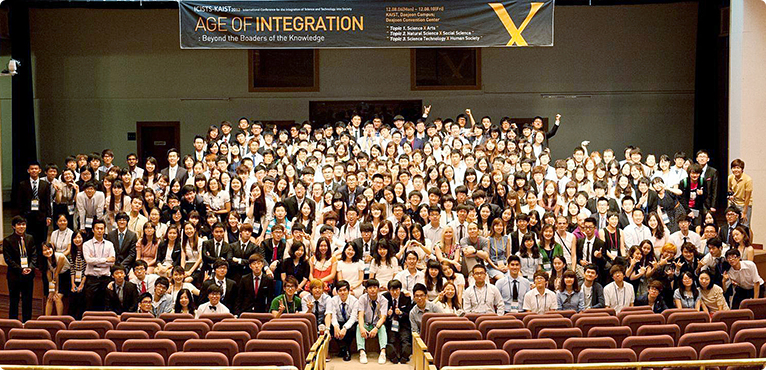 2013 International Conference for the Integration of Science, Technology, and Society at KAIST (ICISTS-KAIST)
The International Conference for the Integration of Science, Technology, and Society at KAIST (ICISTS-KAIST) is a global forum organized by KAIST undergraduate students to promote the exchange of ideas and facilitate the discussion of issues that are important to science, technology, society, and higher education. The ICISTS-KAIST conference has been held annually every summer since 2005, inviting distinguished speakers and guests from all around the world to share their insights and expertise with students gathered from Korea and abroad. Last year alone, more than 300 students from 22 nations and 40 speakers participated in the event.
Originally, the ICISTS-KAIST was established by KAIST students who were inspired by the Harvard Project for Asian and International Relations (HPAIR), which is one of the Harvard’s largest annual student conferences in Asia.
This year, 335 students from 103 universities in 22 countries joined the conference that was held on August 5th-9th in Daejeon, making the 2013 ICISTS-KAIST the biggest science and engineering gathering hosted by university students in Asia. About 36% of the participants were international students.
The theme of the conference was “Perfect Alliance: Coexistence for Human Society,” in which students and speakers addressed issues on how to harmonize the speed of scientific progress with the development of important values in society, as well as to explore solutions to overcome the chasm, if any, between the boundaries of science and society.
In his opening remarks, President Steve Kang said, “Creativity and innovation are born out of openness. Therefore, it is essential for young scientists and engineers to communicate with people from different cultural and political backgrounds. Through this kind of global interaction and exchange of ideas and views, students will have an opportunity to deepen their understanding of the world and to better examine the purpose of their intellectual exploration in science and technology.” At the 2013 ICISTS-KAIST, 25 distinguished speakers participated including Walter Bender, a former director of the Media Lab at MIT and David Christian, a professor of Macquarie University in Australia.
2013.08.08 View 11430
2013 International Conference for the Integration of Science, Technology, and Society at KAIST (ICISTS-KAIST)
The International Conference for the Integration of Science, Technology, and Society at KAIST (ICISTS-KAIST) is a global forum organized by KAIST undergraduate students to promote the exchange of ideas and facilitate the discussion of issues that are important to science, technology, society, and higher education. The ICISTS-KAIST conference has been held annually every summer since 2005, inviting distinguished speakers and guests from all around the world to share their insights and expertise with students gathered from Korea and abroad. Last year alone, more than 300 students from 22 nations and 40 speakers participated in the event.
Originally, the ICISTS-KAIST was established by KAIST students who were inspired by the Harvard Project for Asian and International Relations (HPAIR), which is one of the Harvard’s largest annual student conferences in Asia.
This year, 335 students from 103 universities in 22 countries joined the conference that was held on August 5th-9th in Daejeon, making the 2013 ICISTS-KAIST the biggest science and engineering gathering hosted by university students in Asia. About 36% of the participants were international students.
The theme of the conference was “Perfect Alliance: Coexistence for Human Society,” in which students and speakers addressed issues on how to harmonize the speed of scientific progress with the development of important values in society, as well as to explore solutions to overcome the chasm, if any, between the boundaries of science and society.
In his opening remarks, President Steve Kang said, “Creativity and innovation are born out of openness. Therefore, it is essential for young scientists and engineers to communicate with people from different cultural and political backgrounds. Through this kind of global interaction and exchange of ideas and views, students will have an opportunity to deepen their understanding of the world and to better examine the purpose of their intellectual exploration in science and technology.” At the 2013 ICISTS-KAIST, 25 distinguished speakers participated including Walter Bender, a former director of the Media Lab at MIT and David Christian, a professor of Macquarie University in Australia.
2013.08.08 View 11430 -
 KAIST Undergraduates Open Four-Day International Conference
The ICISTS-KAIST, an annual international conference organized by KAIST undergraduate students, opened on Thursday (Aug. 20) at the KAIST"s main campus in Daejeon.
The 2009 ICISTS (International Conference for the Integration of Science and Technology into Society) drew around 200 experts and students from 44 countries. Since its inception in 2005 to promote discourse on important science and technology issues affecting modern society, the conference has served as an opportunity for academic networking among students in various parts of the world.
The four-day conference consists of lectures, open discussions among lecturers and students, field trips to help students to understand actual applications, and team projects.
This year"s conference offers three workshops under the themes of "Climate Change: Merging Technology and Policy for Green Solutions"; "Human-Computer Interaction: Designing Computer System for Intuitive Human Access"; and "Nano Clinic: Breakthrough in Conquering Disease."
Lectures by invited experts in various scientific fields will help broaden students" perspectives particularly from interdisciplinary viewpoints, said an organizer of the conference.
2009.08.28 View 16460
KAIST Undergraduates Open Four-Day International Conference
The ICISTS-KAIST, an annual international conference organized by KAIST undergraduate students, opened on Thursday (Aug. 20) at the KAIST"s main campus in Daejeon.
The 2009 ICISTS (International Conference for the Integration of Science and Technology into Society) drew around 200 experts and students from 44 countries. Since its inception in 2005 to promote discourse on important science and technology issues affecting modern society, the conference has served as an opportunity for academic networking among students in various parts of the world.
The four-day conference consists of lectures, open discussions among lecturers and students, field trips to help students to understand actual applications, and team projects.
This year"s conference offers three workshops under the themes of "Climate Change: Merging Technology and Policy for Green Solutions"; "Human-Computer Interaction: Designing Computer System for Intuitive Human Access"; and "Nano Clinic: Breakthrough in Conquering Disease."
Lectures by invited experts in various scientific fields will help broaden students" perspectives particularly from interdisciplinary viewpoints, said an organizer of the conference.
2009.08.28 View 16460 -
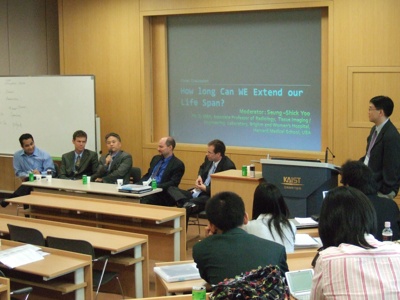 Int'l Conference for Integration of Science & Technology into Society Opens
The 2008 International Conference for the Integration of Science and Technology into Society (ICISTS-KAIST) opened a four-day meeting on Tuesday (July 15) at Daejeon KAIST campus. The conference is an annual event organized by a group of KAIST undergraduate students.
The fifth-year gathering is designed to provide participants with an opportunity to broaden their scientific perspectives by sharing ideas and experiences in related topics, as well as building an international human network. This year"s event has drawn about 200 students from 40 countries.
The centerpiece of the conference is three workshops on the following themes; Human-Robot Symbiotic Society, Neo-brain Science and Trafficmatics. Myung-Ja Kim, former Korean Environment Minister, will appear as a keynote speaker.
In the workshop sessions, two speakers will discuss specific issues and arrive at a tentative conclusion. Participants will have the opportunity to participate in the debate through Q&A for each session.
The first theme "Human-Robot Symbiotic Society" delves into the current trend that robot is being transformed into a perceivable and touchable concept from an abstract one. Guests for the workship include June-Ho Oh, professor at the Department of Mechanical Engineering, KAIST; James Dater, professor at the Department of Political Science, University of Hawaii at Manoa, and Director of the Hawaii Research Center for Future; Michael Pollitt, CEO of Shadow Robot Company; and Steven Dubowsky, professor at the Department of Mechanical Engineering, MIT.
The second theme "Neo-Brain Science" focuses on attempts to shed light on brain from diverse perspectives including psychology, economics and art. Among invited speakers are Prof. Jai-Seung Jung at the Department of Bio and Brain Engineering, KAIST; Prof. Un-Jung Kang at the University of Chicago Medical Center; and Peter Geyer, a consultant for the Association for Psychological Type.
The third workshop on "Traffimatics" will deal with "intelligent transport systems (ITS)" which will discusst new paradigm in transportation policy and traffic engineering. On the list of speakers are Assaf Biderman, assistant director, SENSEable City Laboratory, MIT; Prof. Richard Tay, at the Department of Civil Engineering, University of Calgary; Prof. Shoshi Mizokami at Kumamoto University; and Ho-Jong Baik, research associate professor of Virginia Tech.
2008.07.16 View 21093
Int'l Conference for Integration of Science & Technology into Society Opens
The 2008 International Conference for the Integration of Science and Technology into Society (ICISTS-KAIST) opened a four-day meeting on Tuesday (July 15) at Daejeon KAIST campus. The conference is an annual event organized by a group of KAIST undergraduate students.
The fifth-year gathering is designed to provide participants with an opportunity to broaden their scientific perspectives by sharing ideas and experiences in related topics, as well as building an international human network. This year"s event has drawn about 200 students from 40 countries.
The centerpiece of the conference is three workshops on the following themes; Human-Robot Symbiotic Society, Neo-brain Science and Trafficmatics. Myung-Ja Kim, former Korean Environment Minister, will appear as a keynote speaker.
In the workshop sessions, two speakers will discuss specific issues and arrive at a tentative conclusion. Participants will have the opportunity to participate in the debate through Q&A for each session.
The first theme "Human-Robot Symbiotic Society" delves into the current trend that robot is being transformed into a perceivable and touchable concept from an abstract one. Guests for the workship include June-Ho Oh, professor at the Department of Mechanical Engineering, KAIST; James Dater, professor at the Department of Political Science, University of Hawaii at Manoa, and Director of the Hawaii Research Center for Future; Michael Pollitt, CEO of Shadow Robot Company; and Steven Dubowsky, professor at the Department of Mechanical Engineering, MIT.
The second theme "Neo-Brain Science" focuses on attempts to shed light on brain from diverse perspectives including psychology, economics and art. Among invited speakers are Prof. Jai-Seung Jung at the Department of Bio and Brain Engineering, KAIST; Prof. Un-Jung Kang at the University of Chicago Medical Center; and Peter Geyer, a consultant for the Association for Psychological Type.
The third workshop on "Traffimatics" will deal with "intelligent transport systems (ITS)" which will discusst new paradigm in transportation policy and traffic engineering. On the list of speakers are Assaf Biderman, assistant director, SENSEable City Laboratory, MIT; Prof. Richard Tay, at the Department of Civil Engineering, University of Calgary; Prof. Shoshi Mizokami at Kumamoto University; and Ho-Jong Baik, research associate professor of Virginia Tech.
2008.07.16 View 21093 -
 KAIST Receiving Applications for Intelligent SoC Robot War
KAIST is receiving applications to participate in the 2008 Intelligent SoC Robot War through the annual contest"s homepage at www.socrobotwar.org. Application deadline is May 1.
The annual contest features battles between mechanical robots utilizing System on Chip (SoC) technology. The annual robot competition, which began in 2002, is scheduled for Oct. 15-19 this year at the Indian Hall of Convention & Exhibition Center (COEX) in southern Seoul.
The Intelligent SoC Robot War Contest has two sections, Tank Robot and Taekwon Robot. In the Tank Robot contest, robots in the form of tanks engage in duels with laser beams through visual recognition, wireless communication, and audio recognition. On the other hand, the Taekwon Robot contest is a hand-to-hand fight. The robots had to be capable of defending, recognizing the opponent, and attacking without external control.
Any team consisting of more than two people and under six undergraduate or graduate students are eligible to take part in the competition.
Prior to the contest, preliminary assessments and the final selection will be made between July and September.
2008.04.14 View 14762
KAIST Receiving Applications for Intelligent SoC Robot War
KAIST is receiving applications to participate in the 2008 Intelligent SoC Robot War through the annual contest"s homepage at www.socrobotwar.org. Application deadline is May 1.
The annual contest features battles between mechanical robots utilizing System on Chip (SoC) technology. The annual robot competition, which began in 2002, is scheduled for Oct. 15-19 this year at the Indian Hall of Convention & Exhibition Center (COEX) in southern Seoul.
The Intelligent SoC Robot War Contest has two sections, Tank Robot and Taekwon Robot. In the Tank Robot contest, robots in the form of tanks engage in duels with laser beams through visual recognition, wireless communication, and audio recognition. On the other hand, the Taekwon Robot contest is a hand-to-hand fight. The robots had to be capable of defending, recognizing the opponent, and attacking without external control.
Any team consisting of more than two people and under six undergraduate or graduate students are eligible to take part in the competition.
Prior to the contest, preliminary assessments and the final selection will be made between July and September.
2008.04.14 View 14762 -
 Gonggam Emerged as 22nd Undergraduate Student Association
After elections on November 29, Gonggam emerged as the 22nd Undergraduate Student Association of the Korea Advanced Institute of Science and Technology (KAIST).
The election for the Undergraduate Student Association was held on November 29 from 8:00a.m to 7:00p.m. Students voted in seven different locations: the Digital Science Library, the Main Administration Building, Tae-Wul Gwan, the east and west cafeterias, the Undergraduate Cafeteria, and the Student Center. Students who participated in the election were required to bring their student cards or resident registration cards for identification. A group of avid volunteer members assisted in the election, leading students to the voting site and making sure everything was under control. Should the voting rate not exceed 50%, the election was to be prolonged a couple more days. But thanks to the high level of student participation, the election process was completed successfully without any further extension. Out of the 2790 undergraduate students, 1217 students casted their votes setting a new voting rate record of 57.7% in years.
Gonggam party was the only group running for the Undergraduate Student. Voters were required to choose either in favor of or against the election of Gonggam. 1217 voters supported Gonggam while 381 opposed to their election. The Gonggam party was thereby elected by unanimous vote as the new Undergraduate Student Association. According to the student rules, their official term is supposed to begin as of March, but they will immediately take office and undertake the business of the former president council.
The Gonggam party is literally based on the principle of “consensus”. During their campaign, they explained that their main goal is to bring about positive changes which the majority of the students agree upon. More specifically, their three main objectives are as follows: cultivating a culturally-vibrant environment by inviting various artists and entertainment guests to KAIST; establishing an Undergraduate Student Committee to represent the student body and make sure educational reforms reflect the students’ interests; and lastly, encouraging students to develop a social consciousness by holding discussion/debate forums on various social issues with local citizen organizations and expert panels.By KAIST Herald on December, 2007
2007.12.21 View 12364
Gonggam Emerged as 22nd Undergraduate Student Association
After elections on November 29, Gonggam emerged as the 22nd Undergraduate Student Association of the Korea Advanced Institute of Science and Technology (KAIST).
The election for the Undergraduate Student Association was held on November 29 from 8:00a.m to 7:00p.m. Students voted in seven different locations: the Digital Science Library, the Main Administration Building, Tae-Wul Gwan, the east and west cafeterias, the Undergraduate Cafeteria, and the Student Center. Students who participated in the election were required to bring their student cards or resident registration cards for identification. A group of avid volunteer members assisted in the election, leading students to the voting site and making sure everything was under control. Should the voting rate not exceed 50%, the election was to be prolonged a couple more days. But thanks to the high level of student participation, the election process was completed successfully without any further extension. Out of the 2790 undergraduate students, 1217 students casted their votes setting a new voting rate record of 57.7% in years.
Gonggam party was the only group running for the Undergraduate Student. Voters were required to choose either in favor of or against the election of Gonggam. 1217 voters supported Gonggam while 381 opposed to their election. The Gonggam party was thereby elected by unanimous vote as the new Undergraduate Student Association. According to the student rules, their official term is supposed to begin as of March, but they will immediately take office and undertake the business of the former president council.
The Gonggam party is literally based on the principle of “consensus”. During their campaign, they explained that their main goal is to bring about positive changes which the majority of the students agree upon. More specifically, their three main objectives are as follows: cultivating a culturally-vibrant environment by inviting various artists and entertainment guests to KAIST; establishing an Undergraduate Student Committee to represent the student body and make sure educational reforms reflect the students’ interests; and lastly, encouraging students to develop a social consciousness by holding discussion/debate forums on various social issues with local citizen organizations and expert panels.By KAIST Herald on December, 2007
2007.12.21 View 12364 -
 Students Meet with KAIST Development Foundation
A group of department representatives and distinguished school staff gathered on November 21st to discuss the future funding of Korea Advanced Institute of Science and Technology (KAIST). Participants of the meeting included the Vice President, Dean of Academic Affairs, Director of Welfare, the President of Undergraduate Student Association, and many more. The Vice President explained that students and alumnae are the owners of KAIST and should take pride in the successful development of KAIST. He also added that they should share the same goal of supporting KAIST to become the world"s leading institute of science and technology.
Statistics show a noticeable correlation between a university"s status in world rankings and the percentage of its alumni donation participants. In the case of top U.S. universities, a large number of their alumnae donate astronomical sums of money in hopes to contribute to the school"s development. For example, in 2006, a whopping 61% of the Princeton University alumni participated in school donations, while - in stark contrast - a meager 1.1% of 31,000 KAIST alumnae made monetary contributions. Perhaps this low level of donation participation explains why KAIST is making little progress in its efforts to advance into a globally-recognized university.
"Before we die, many of us look back and regret "I should"ve earned a little more"," said the Vice President. "But what we should really reflect on is how I could"ve given a little more." Throughout the meeting, he reiterated the significance of enrolled students practicing donation, no matter how insignificant the amount, when they are still young.
KAIST is currently receiving support from its alumni, parents, students, corporations, foundations, professors and staff. With a growing demand for increasing the number of professors, research fees and labor budget, however, KAIST requires the full support and dedication of students and alumnae alike if it is to fulfill its vision of becoming the academic leader in science and technology- it is essential for students to get accustomed to the habit of donating to the school. To promote this practice of contributing, the Vice President urged students to look for opportunities to make donations.By KAIST Herald on December, 2007
2007.12.21 View 13964
Students Meet with KAIST Development Foundation
A group of department representatives and distinguished school staff gathered on November 21st to discuss the future funding of Korea Advanced Institute of Science and Technology (KAIST). Participants of the meeting included the Vice President, Dean of Academic Affairs, Director of Welfare, the President of Undergraduate Student Association, and many more. The Vice President explained that students and alumnae are the owners of KAIST and should take pride in the successful development of KAIST. He also added that they should share the same goal of supporting KAIST to become the world"s leading institute of science and technology.
Statistics show a noticeable correlation between a university"s status in world rankings and the percentage of its alumni donation participants. In the case of top U.S. universities, a large number of their alumnae donate astronomical sums of money in hopes to contribute to the school"s development. For example, in 2006, a whopping 61% of the Princeton University alumni participated in school donations, while - in stark contrast - a meager 1.1% of 31,000 KAIST alumnae made monetary contributions. Perhaps this low level of donation participation explains why KAIST is making little progress in its efforts to advance into a globally-recognized university.
"Before we die, many of us look back and regret "I should"ve earned a little more"," said the Vice President. "But what we should really reflect on is how I could"ve given a little more." Throughout the meeting, he reiterated the significance of enrolled students practicing donation, no matter how insignificant the amount, when they are still young.
KAIST is currently receiving support from its alumni, parents, students, corporations, foundations, professors and staff. With a growing demand for increasing the number of professors, research fees and labor budget, however, KAIST requires the full support and dedication of students and alumnae alike if it is to fulfill its vision of becoming the academic leader in science and technology- it is essential for students to get accustomed to the habit of donating to the school. To promote this practice of contributing, the Vice President urged students to look for opportunities to make donations.By KAIST Herald on December, 2007
2007.12.21 View 13964